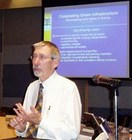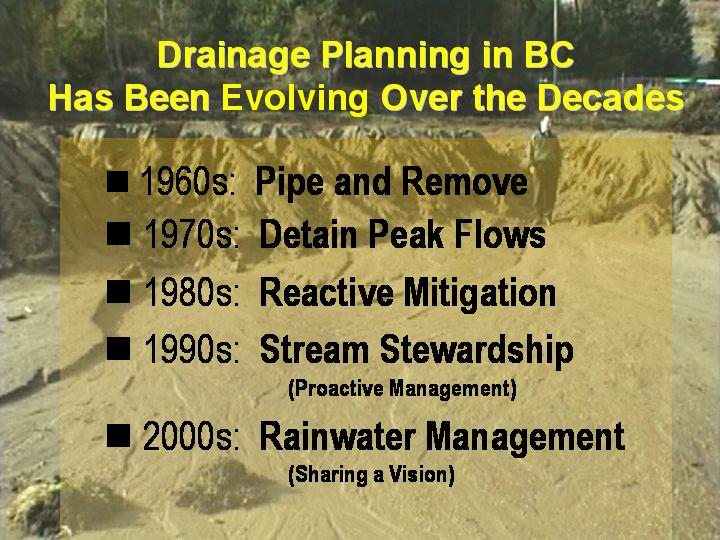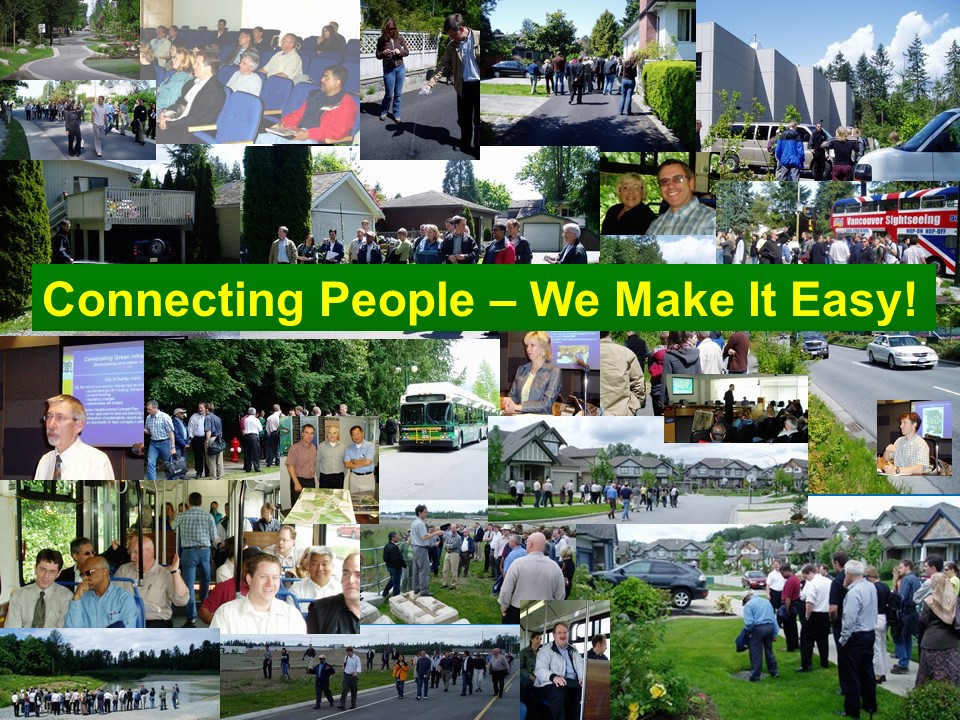Knowledge Transition Strategy: University of British Columbia Hosts National Conference on Rainwater Management
Canadian Water Network sponsors ‘Knowledge Translation Strategy’ to facilitate paradigm-shift from ‘stormwater management’ to ‘rainwater management’
The University of British Columbia (UBC) is the lead organization for a national initiative that is being led by Dr. Hans Schreier. The objective is to create a national network of experts that collaborate and share their experiences. To make things happen, earlier this year the Institute for Resources, Environment and Sustainability at UBC received a grant from the Canadian Water Network to promote a ’knowledge translation strategy’.
As an element of the strategy, the Institute hosted a conference at UBC in June 2007 that provided a forum for practitioners, researchers and decision-makers from across Canada to share knowledge and experiences regarding advances in the theory, methods and practices of rainwater management and planning.
Registration: To download the program agenda, please click on this link to Innovative Stormwater Management Conference.
Scope of Research Effort
The key issues to be addressed by the UBC-led team of researchers are:
- Increasing infiltration on-site by influencing the rainfall-runoff processes and thus reducing flow variability in streams.
- Reducing the impacts of pollutants by retaining sediments and pollutants in ponds and wetlands, and utilizing processes of sedimentation, adsorption and precipitation.
- Address the long-term maintenance problems of how to deal with the pollutants that are accumulating in existing stormwater detention systems.
- Examine scaling and cumulative effects when building a comprehensive and integrated rainwater management system in a watershed context.
Inter-Provincial Partnerships
The initiative is being undertaken in collaboration with the British Columbia-based Inter-Governmental Partnership that developed the Water Balance Model for Canada.
Partnership members who are also involved in the ‘knowledge translation strategy’ include the City of Calgary, Canada Mortgage & Housing Corporation, Environment Canada, and the District of North Vancouver.
“We already have an inter-provincial partnership with Alberta, and believe this UBC-led initiative will help open doors to form partnerships with other provinces”, notes Ted van der Gulik (BC Ministry of Agriculture and Lands), Chair of the Inter-Governmental Partnership.
From Stormwater Management to Rainwater Management
“The vocabulary of the drainage practitioner is changing, and is being simplified so that there will be a clearer public understanding of source control options for capturing rain where it falls. This change has seen the single function view of traditional ‘stormwater management’ give way to the integrated and comprehensive perspective that is captured by the term ‘rainwater management’,” explains Ted van der Gulik.
 According to Dr. Schreier, “To provide a point of departure that would be familiar to engineers, we decided to use the stormwater word in the conference title. However, once conference participants arrive, we will be educating them as to why they should be making a conscious effort to make the mind-shift to rainwater management instead.”
According to Dr. Schreier, “To provide a point of departure that would be familiar to engineers, we decided to use the stormwater word in the conference title. However, once conference participants arrive, we will be educating them as to why they should be making a conscious effort to make the mind-shift to rainwater management instead.”
Understand the Difference
Stormwater management has a narrow scope, is event-based, and only considers a handful of events that might occur in a given year. In contrast, contemporary ‘rainwater management’:
- Has a broad scope and accounts for all the rainfall-days that occur each year; and
- Encompasses both water use and rainwater runoff.
Desired rainwater management outcomes include using less irrigation water and reducing rainwater runoff.
Change the Vocabulary
“Changing the vocabulary of the drainage practitioner is part and parcel of implementing integrated solutions that are landscape-based, and are guided by this over-arching principle: The way land is developed determines how water is used, and how water runs off the land. At the end of the day, it is all about the role that trees, soil and vegetation play in reducing rainwater runoff volume”, notes Dr. Schreier.
In a North American context, British Columbia is leading the way in changing the practitioner vocabulary to reflect advances in the nature of the practice. Rainwater management, not stormwater management, is the term generally used in Europe.
To Learn More:
For more background on why the ‘drainage vocabulary’ is changing, click on Stormwater Management, Low Impact Development, Sustainable Drainage, Green Infrastructure, RAINwater Management…. what is an appropriate term to use?
Green Infrastructure Tour
The conference was a two-day event. On Day Two there was a tour of a number of sites in the Greater Vancouver region. The tour drew on the experience of the Green Infrastructure Partnership in implementing an outreach program called Celebrating Green Infrastructure: Showcasing Innovation in the Greater Vancouver Region.
Design with Nature
 The Green Infrastructure Partnership is chaired by Paul Ham (General Manager, Engineering) of the City of Surrey. According to Ham, “The goal of the Celebrating Green Infrastructure Program is to build regional capacity through sharing of green infrastructure approaches, experiences and lessons learned as an outcome of ‘designing with nature’. The program was launched in May 2006 in the Greater Vancouver region as a provincial pilot, and will continue in 2007. Local governments on Vancouver Island are undertaking a similar initiative in September 2007.”
The Green Infrastructure Partnership is chaired by Paul Ham (General Manager, Engineering) of the City of Surrey. According to Ham, “The goal of the Celebrating Green Infrastructure Program is to build regional capacity through sharing of green infrastructure approaches, experiences and lessons learned as an outcome of ‘designing with nature’. The program was launched in May 2006 in the Greater Vancouver region as a provincial pilot, and will continue in 2007. Local governments on Vancouver Island are undertaking a similar initiative in September 2007.”
By pooling resources under a regional partnership framework for outreach and continuing education, municipalities in the Greater Vancouver region are leveraging the efforts of their own staffs and developing a common understanding of issues and solutions.




